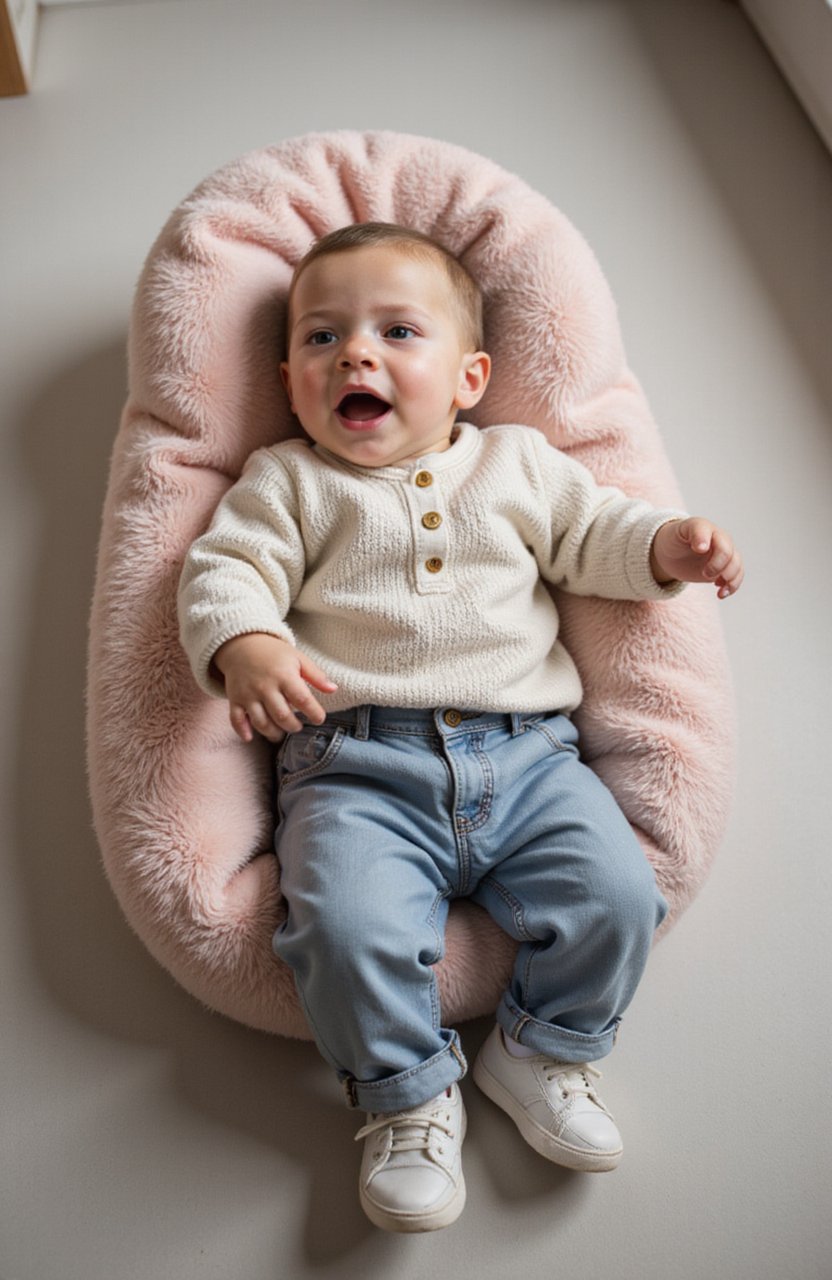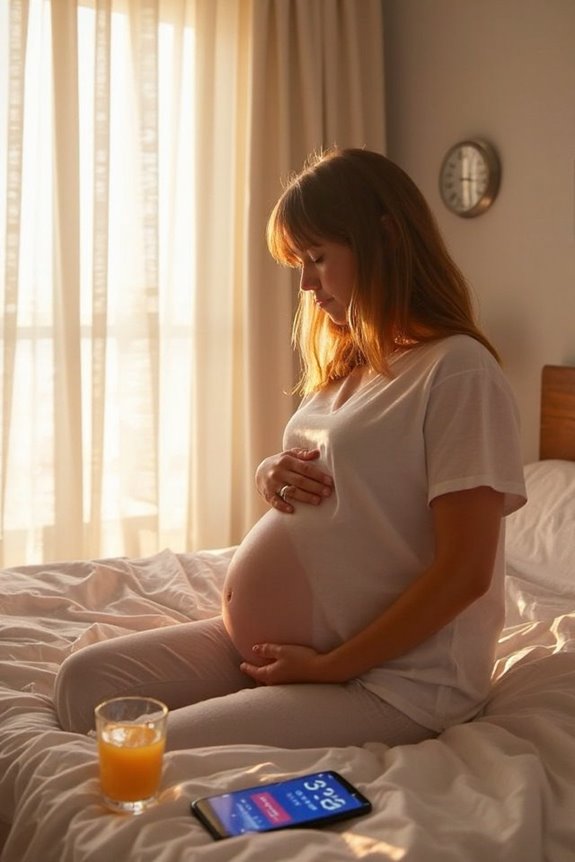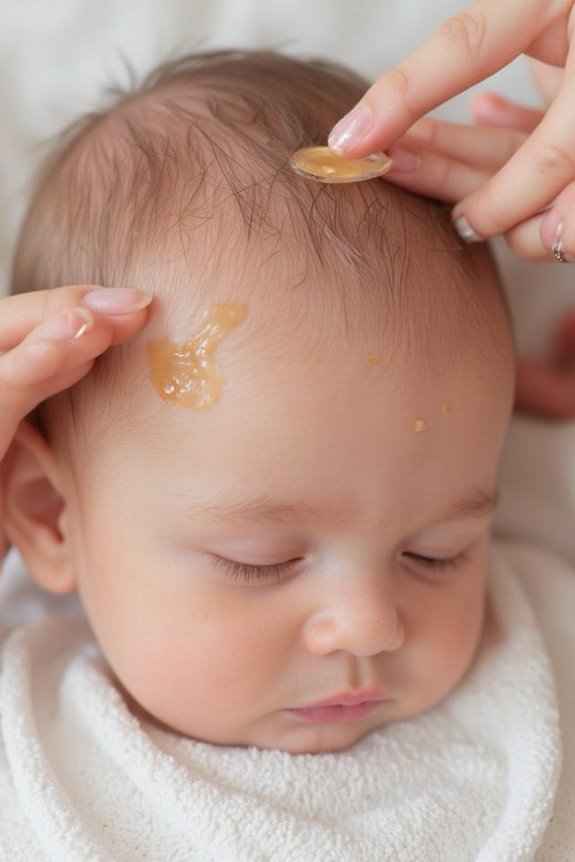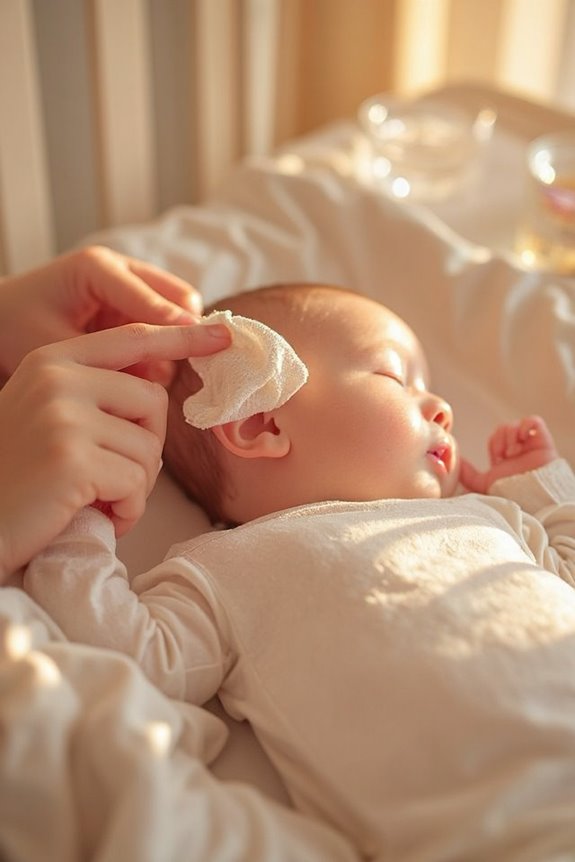A baby’s cold typically lasts 7-14 days, but can sometimes stretch to three weeks. In the first few days, you’ll notice congestion and fussiness. Symptoms usually peak around days 3-5, with the worst congestion and possible cough. Gradual improvement begins around day 5, with most symptoms clearing by days 10-14. Contact your pediatrician if your baby is under 3 months, has a persistent fever, or shows breathing difficulties. The sections below explain what to watch for throughout your baby’s recovery.
Key Takeaways
- Baby colds typically last 1-2 weeks, though some symptoms may linger for up to 3 weeks.
- The first 2-3 days show initial symptoms like congestion and fussiness, with peak symptoms around days 3-5.
- Most cold symptoms begin to improve after day 5, with significant recovery by days 10-14.
- Nasal discharge often changes from clear to yellow/green during the course of the illness.
- Contact your pediatrician if symptoms worsen after 7-10 days or if your baby is under 3 months old.
The Common Timeline of Baby Colds
While most parents expect it, a baby’s cold can feel like it lasts forever. Let me walk you through the typical cold symptom progression so you’ll know what to expect:
- First 2-3 days: Symptoms typically begin with congestion, slight fever, and fussiness
- Days 3-5: Peak symptoms often occur, with increased congestion and possible cough
- Days 5-10: Gradual improvement begins, though some symptoms persist
- Days 10-14: Most symptoms resolve during this typical recovery timeline
Your baby’s cold will generally last 1-2 weeks, though some symptoms like cough or runny nose may linger for up to 3 weeks. Seasonal factors play a role too—fall and winter months see more colds due to increased indoor exposure to viruses.
Recognizing Cold Symptoms in Infants
How can you tell if your baby’s sniffles are actually a cold? When cold triggers like viruses challenge your infant’s immunity, several key symptoms typically appear:
• Nasal discharge that starts clear before turning yellow or green
- Congestion making breathing and nursing difficult
- Mild fever, particularly concerning in babies under two months
- Frequent sneezing and coughing, often worse at night
- Congestion making breathing and nursing difficult
You’ll likely notice:
- Decreased appetite and nursing difficulties
- Increased fussiness and irritability
- Disturbed sleep patterns
Watch for more serious signs that require medical attention:
- Respiratory distress or wheezing
- Blue-tinged lips
- Persistent cough (over three weeks)
- Vomiting, diarrhea, or earache symptoms
Remember that most colds last about two weeks, with symptoms potentially worsening before improving.
When to Contact Your Pediatrician

Although most baby colds resolve on their own, certain situations demand prompt medical attention. As a parent, knowing when to seek pediatric advice can make a significant difference in your child’s recovery.
Contact your doctor immediately if:
- Your baby is under 3 months old with cold symptoms
- Fever persists longer than 3-5 days
- Your child shows breathing difficulties or severe congestion
- Symptoms worsen rather than improve after 7-10 days
- Your baby experiences vomiting or diarrhea with the cold
Health concerns such as persistent high fever, lethargy, or refusal to feed require urgent evaluation. For babies with underlying conditions like asthma, seek medical guidance sooner rather than later. Remember that while most colds are harmless, your pediatrician is your best resource when symptoms seem concerning.
Home Remedies for Baby Cold Relief
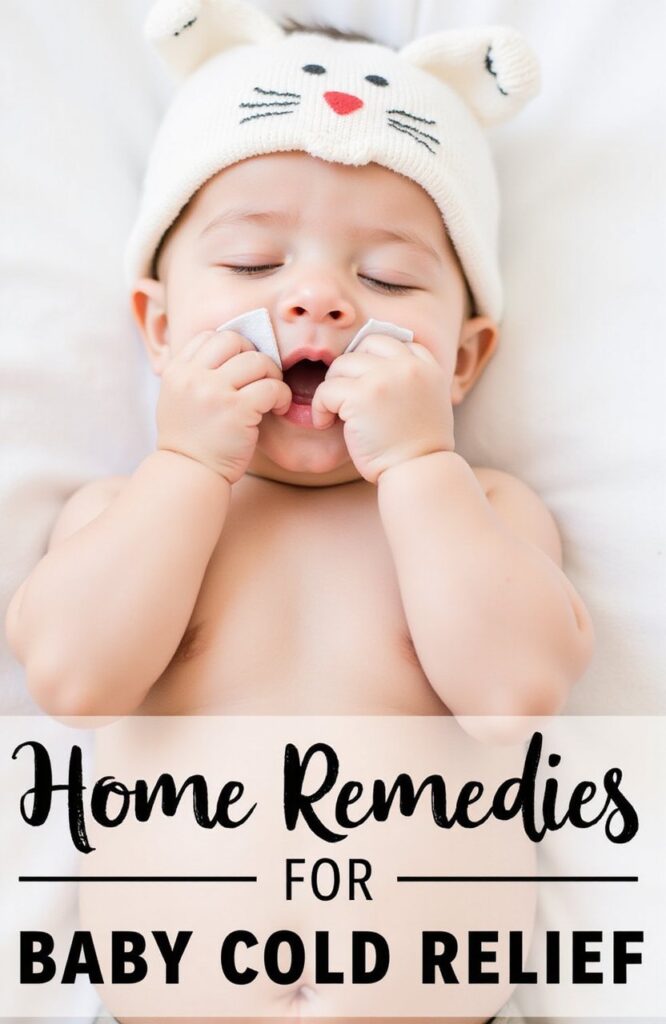
When your baby’s stuffy nose and coughing keep everyone up at night, you’ll be glad to know several effective home remedies can provide relief without medication.
Natural treatments for nasal congestion include:
- Using a bulb syringe to gently suction mucus
- Running a humidifier to add moisture to the air
- Applying petroleum jelly under the nose to protect sensitive skin
Soothing techniques to try:
- Keep baby upright to reduce congestion during sleep
- Offer a warm bath to provide comfort
- Confirm proper hydration with breast milk or formula
- Use a pacifier to comfort and help with coughing
Remember: never give honey to babies under one year old, and avoid over-bundling which can cause overheating. Always consult your pediatrician before trying new remedies or treatments.
Preventing Colds in Babies
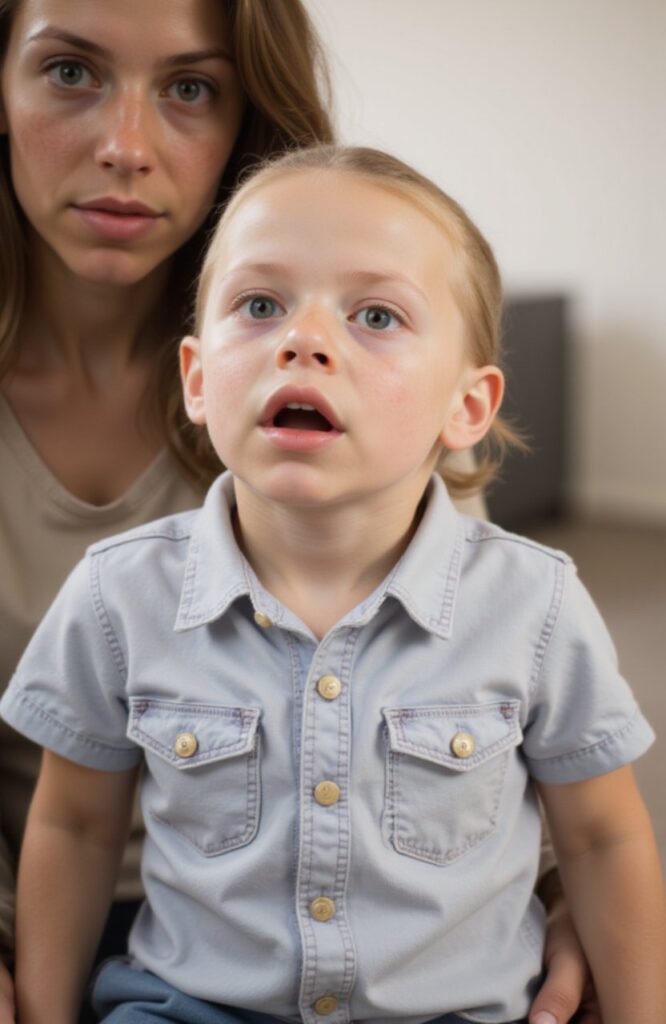
Since a baby’s immune system hasn’t fully developed, they’re particularly vulnerable to catching colds. As a parent, I’ve found that cold prevention requires consistent effort, especially during fall through spring when viruses circulate more actively.
The most effective strategies include:
- Frequent handwashing with soap for everyone who handles your baby
- Keeping your little one away from visibly sick individuals
- Regularly sanitizing toys and frequently touched surfaces
- Ensuring your baby gets adequate sleep for immune support
- Providing a nutritionally balanced diet appropriate for their age
I’ve also learned that reducing exposure to large gatherings during cold season considerably lowers infection risk. When someone must cough or sneeze, doing so into their elbow rather than hands prevents germ spread—a simple habit that offers substantial protection.
Factors That May Extend Cold Duration
While most baby colds resolve within 10-14 days, several factors can significantly lengthen your little one’s recovery time.
The cold severity plays a significant role – higher viral loads typically cause more intense and prolonged symptoms. I’ve found that babies under three months are especially vulnerable to extended illnesses due to their immature immune systems.
Watch for these complicating factors:
- Overlapping infections (catching a new virus before recovering from the first)
- Ear infections developing as complications
- Dehydration from reduced fluid intake
- Exposure to other sick children
- Poor ventilation in your home
Environmental conditions matter too. During fall through spring, when viruses circulate more readily, your baby faces increased exposure risk, potentially leading to longer or back-to-back colds.
Supporting Your Baby Through Recovery
Caring for a sick baby requires specific supportive measures to help them recover comfortably. During this challenging time, ensuring proper hydration importance cannot be overstated – continue regular feeding with breast milk or formula to maintain necessary fluid intake.
- Use a nasal aspirator for regular nasal suction to clear congested passages
- Run a humidifier in baby’s room to keep air moist and ease breathing
- Encourage plenty of rest to support their natural healing process
- Monitor for any worsening symptoms that might require medical attention
I recommend creating a comfortable environment with consistent temperature and minimal disturbances. Remember that most colds resolve within 7-10 days, though some symptoms like coughing or nasal discharge may persist slightly longer. Always consult your pediatrician if you’re concerned about recovery progress.
Frequently Asked Questions
Can a Breastfeeding Mom’s Diet Affect Her Baby’s Cold Symptoms?
While there’s no direct evidence that my dietary changes affect your baby’s cold symptoms, foods rich in omega-3s, vitamins, and zinc may enhance breast milk quality, potentially providing immune support during illness.
Is It Safe to Travel With a Baby Who Has a Cold?
I’d be cautious traveling with a sick baby. It’s generally safe, but take travel precautions like packing cold remedies, maintaining hand hygiene, and being prepared to manage symptoms while on the go.
Do Pacifiers Help or Worsen Cold Symptoms in Babies?
I find pacifier use won’t worsen your baby’s cold symptoms and might offer some cold relief by soothing them. Just keep pacifiers clean and consider removing them if breathing becomes difficult.
Can Teething Be Confused With Cold Symptoms?
Yes, I often see parents confuse teething signs with colds. Both cause irritability and sleep issues, but teething focuses on mouth discomfort and drooling, while colds include respiratory symptoms in the cold comparison.
Should Siblings Be Kept Separated When One Has a Cold?
I’d recommend temporary separation to limit sibling exposure during a cold. Good hand hygiene and cleaning shared surfaces are your best cold prevention strategies when complete separation isn’t practical in your household.

